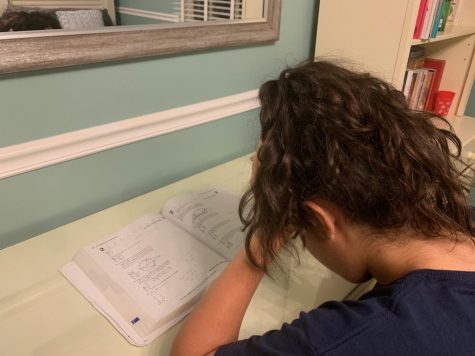Mental Health at DHS: How to Better Manage Anxiety and Stress
January 21, 2020
Stress is irrefutably a natural part of life. Whether the stressor is connected to academics, interests, or interactions with others, everyone gets stressed to some degree. For students at DHS specifically, sometimes it may feel as if the anxiety caused by homework, tests, or extracurriculars is overwhelming. When students’ lives continue past graduation, however, the stressors won’t end, which is why it is crucial to learn how to see them as challenges to strengthen resilience rather than threats. Despite the fact that there are many aspects of high schoolers’ lives that could cause anxiety, there are also a number of things DHS students can easily do that will help them relieve stress and lead more carefree lives.
Whether it’s school-related or outside of DHS, there are a lot of things that stress students out. Ben Zamler, a DHS junior who is involved in time-intensive sports and extracurriculars, recalled how time and sleep play a role in his anxiety. “Teachers give too much homework,” he claimed. “It’s a lot, and doing that plus running after school makes it so that I rarely get enough sleep. If you’re tired all day you may not retain the information you need to know in order to do well on a test, which just causes more stress.”
Zamler is a big proponent of teachers communicating with one another to make sure they are never giving too much homework or tests in one day. To anyone who has trouble balancing school responsibilities with extracurriculars, like he often does, he offered some advice. “Sometimes I just tell myself to calm down. The best thing to do is to breathe and think about positive things and your accomplishments.”
DHS psychology and sociology teacher Ms. Walenga knows how critical positive self-talk can be to relieving anxiety and stress. “A lot of times students perceive a stressor when there is none,” she explained. “They’re perceiving it as a threat instead of a challenge. If you perceive it as a threat and you don’t have the coping strategies, then you start to become anxious. You have to cognitively say to yourself that while a situation may be a challenge, you’ve dealt with the challenge before, and you have a lot of people that can help you.”
According to Walenga, it’s all about cognitive perception. This can be difficult, sometimes, because our frontal lobes—which are involved in rational thinking and decision-making—are not fully developed until the age of 26. Instead, when confronted with a stressor, the more developed amygdala—a part of the brain involved with anger and fear—can become overactive and override rational thought. This can cause anxious breakdowns.
It’s challenging to control something that seems to be driven by our biology. In fact, some people are born more predisposed to anxiety and stress. “It’s written in your DNA,” Walenga claimed. “The environment, such as going to a high-stakes, pressure-filled school like Deerfield, can trigger that.”
Although biology does play a crucial role in our stress and anxiety, it is important to remember that it does not definitively determine how stressed and anxious students get. There are several strategies one can use to help alleviate anxiety and stress, most of which require little effort.

Both Walenga and Zamler suggested that sleep and proper nutrition are crucial to having the energy and mental readiness to take on students’ demanding schedules and responsibilities. Like a good night’s sleep, which can boost mood and brain productivity, there are actually certain foods that relieve anxiety and stress.
For example, according to healthline.com, salmon has fatty acids such as EPA and DHA that help regulate levels of serotonin and dopamine in the brain, two neurotransmitters that when active and stable can boost mood and have calming properties. Additionally, turmeric’s and chamomile’s antioxidants reduce brain inflammation which has been linked to decreased anxiety. And the good news is, dark chocolate can help reduce anxiety and stress also, by potentially increasing serotonin and controlling the level of cortisol, a stress hormone, in the body. Other foods such as yogurt, green tea, blueberries, and whole grains are effective in anxiety and stress reduction as well.
Furthermore, there are many resources DHS offers that can help students relieve stress and anxiety. For instance, one can join Breathe group, an 8-week program where students meet together to talk about how to alleviate their anxiety. According to DHS Counseling Department Chair Amy Bricker, Breathe group helps to “teach strategies on how to deal with anxiety and coping with it, whether it’s recognizing physical symptoms connected to stress and anxiety, negative self talk, and making a plan to try different coping strategies to address that.”
Looking for a community of others to share experiences and stressors with is critical to strengthening mental health. In addition to Breathe group, there is a variety of different culture-based groups at DHS where students can find that sense of community.

Also, there are many staff members at DHS that are here for students to help them cope with stress and anxiety. According to Bricker, students can meet with the nurses to discuss mental health concerns, school social workers for social/emotional issues, and counselors are always available to discuss how to cope with stressors. Even if concerns aren’t school-related, DHS offers a variety of ways to support each individual student’s mental health.
As for the future, according to Bricker there are currently efforts to further help students relieve their anxiety and stress at the administrative level. The district is developing a Social-Emotional Learning (SEL) committee, which includes faculty representation from every department. The SEL committee is planning to eventually meet with students on DHS’s Mental Health Advisory Board to discuss how to further support students’ mental health.
Overall, Bricker suggested that maintaining balance between the many aspects of students’ busy lives is critical to peak mental health. Across all aspects of life, not exclusive to academics, asking for help may be the best option for immediate stress relief. “Stress, and learning how to manage it, is a normal part of life,” Bricker noted. “If someone is stressed or anxious it causes a lot of wear and tear on their body, their sleep, their everything. Learning how to manage challenges but also recognizing when it’s too much is crucial to alleviating stress. The students in the building who I feel are the most successful are the ones who know how to ask for help.”
Asking for help may be scary, but know that it never makes someone weak. Good mental health is critical to happiness and personal growth, and hopefully these tips will give the crucial tools necessary for prosperity.

